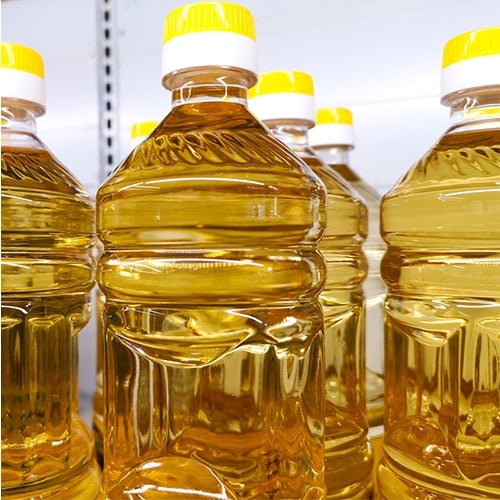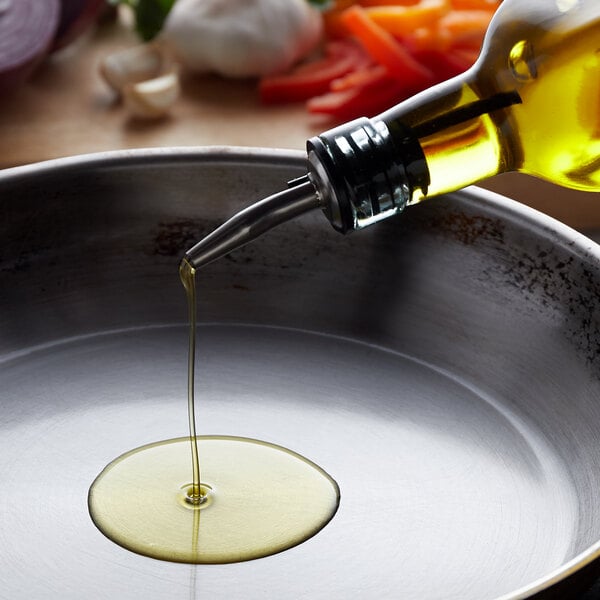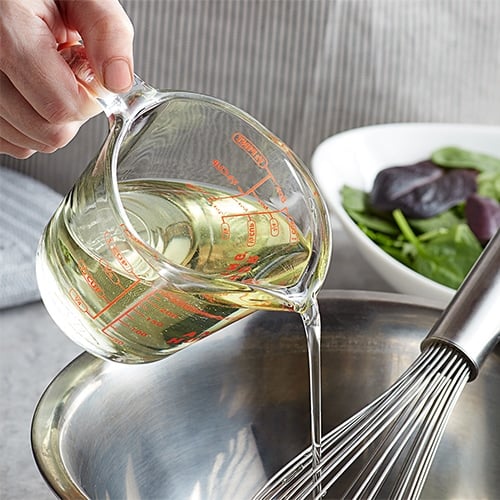Alternatives to Seed Oils
Cooking oil serves many purposes in the world of commercial kitchens. It's used as an ingredient to create a wide range of dishes, it serves as a medium for cooking foods, and it even prevents food from sticking to pans. With so many uses, it's no wonder that cooking oil is a necessary staple to keep on hand. But not all oils are created equal. Some types of cooking oils have been getting bad press in the last few years. Keep reading to learn more about seed oils, why they're falling out of favor with some consumers, and what products can be used as an alternative.
What Are Seed Oils?

Seed oils are extracted from the oil-rich seeds of certain plants. Some of the most commonly used seed oils in the restaurant industry are canola oil, soybean oil, and corn oil. Along with being affordable to buy in bulk, these oils have attributes that make them appealing for foodservice applications. Seed oils have a high smoke point, which is ideal for deep frying. They also have a neutral flavor which makes them useful for making salad dressings, sauces, and marinades.
We'll explain why these oils have gained a negative perception, but don't toss out all of your deep frying oil just yet. You can successfully replace seed oils in a number of cooking applications, but when it comes to commercial deep frying, it can be difficult to find an economical replacement.
Why Do Seed Oils Have a Bad Reputation?
You'll find conflicting information about seed oils online, with some content producers claiming they create inflammation in the body and other experts stating there isn't enough research to back this up definitively. These are the top reasons why seed oils have come under scrutiny:
- Fat Ratios - Seed oils contain a high ratio of polyunsaturated fats to monounsaturated. Within the polyunsaturated fats, there is a high ratio of omega-6 fatty acids to omega-3 fatty acids. High consumption of seed oils means you are taking in more omega-6 than omega-3, which is believed by some to lead to inflammation.
- Refining Process - The processing methods used to extract seed oils can also play a role in their negative reputation. Many seed oils are extracted using high heat and chemical solvents. Refining these oils is what gives them a neutral flavor, but it also strips away nutrients.
- Processed Foods - The link between seed oils and health also comes down to the types of foods that contain these oils. Processed foods are already not very healthy, and these items often contain seed oils.
- Genetically Modified - Genetically modified crops are plants that have been altered at the genetic level to exhibit certain traits, such as resistance to pests or herbicides. Seed oils extracted from these GMO crops, such as soybean, corn, and canola, have become prevalent in the food industry.
Keep in mind that no oil is 100% good for you. Fried foods and processed foods that contain oil should be consumed in moderation if maintaining a healthy diet is important for your customers.
Types of Seed Oils

Seed oil has become a catch-all term for types of cooking oils that are derived from plants and are usually refined. These are some of the most common seed oils used in the foodservice industry:
- Soybean Oil: Known for its neutral flavor and high smoke point, soybean oil is a popular choice for frying, baking, and salad dressings. However, it is a common allergen and may not be suitable for all consumers.
- Canola Oil: Another versatile seed oil, canola oil is often used in cooking due to its mild flavor and high heat tolerance. It is also a good source of heart-healthy fats, making it a popular option in many commercial kitchens.
- Sunflower Oil: Extracted from sunflower seeds, this oil is rich in vitamin E and has a light flavor profile, making it ideal for sauteing, frying, and baking. Sunflower oil is also known for its high smoke point, which is beneficial for high-temperature cooking methods.
- Corn Oil: Widely used in the food industry, corn oil is a staple in frying, baking, and salad dressings. It has a mild taste and is budget-friendly, making it a go-to option for many commercial food establishments.
- Cottonseed Oil: While not as common as other seed oils, cottonseed oil is still used in certain food applications. It has a high smoke point and is often found in processed foods, margarine, and salad dressings.
When it comes to the best oils for deep frying at the commercial level, seed oils can't be beaten. If you run a burger shop or fried chicken joint, you probably don't have to worry about losing customers because of the type of oil you use. But, if you operate a health-conscious cafe with limited fried items on the menu, you might be interested in seed oil alternatives.
What about Peanut Oil?
The middle ground between seed oils and non-seed oils lies in products like peanut oil. Technically, peanut oil is considered a seed oil, but it has a lower amount of omega-6 fats than the others on our list. You may want to explore using peanut oil as a deep frying oil, but the drawbacks are that it's expensive and also a common allergen. Using peanut oil for all of your deep frying is a commitment, but it could help set your restaurant apart.
What Are No Seed Oils?

Unlike traditional seed oils, non-seed oils are extracted from fruits, nuts, and other plant sources. These oils are known for their high levels of healthy fats, vitamins, and antioxidants. They contain a higher ratio of omega-3 fats, making them a preferred choice for health-conscious consumers. Non-seed oils are minimally processed, which also means they retain more flavor and nutrients.
Types of No Seed Oils
If you're looking to switch things up in your commercial kitchen, consider exploring the alternatives to seed oils. These non-seed oils have become more sought after due to health claims, and they're also gaining popularity in the culinary world for their distinct taste profiles.
- Coconut Oil: Known for its versatility and distinct flavor, coconut oil is a popular choice for both cooking and baking. Use refined coconut oil for medium-heat applications like sauteing and browning, but not for high-heat deep frying. You can use coconut oil for pan-frying, but it doesn't have the smoke point needed for use in a commercial deep fryer.
- Avocado Oil: Extracted from the flesh of avocados, this oil is rich in monounsaturated fats and has a mild, buttery flavor. Refined avocado oil is suitable for high-heat cooking, but the high price tag of this no seed oil makes it impractical for commercial deep frying. Instead, use avocado oil for sauces and marinades.
- Olive Oil: A staple in Mediterranean cuisine, olive oil is prized for its health benefits and robust flavor profile. Extra virgin olive oil is best used for drizzling over dishes or in salad dressings, while regular olive oil is suitable for cooking at moderate temperatures.
There are other oils grouped with the no seed oils, like walnut oil, almond oil, and macadamia oil. Use these delicate, flavorful oils as a salad oil or for lightly finishing your prepared dishes.
What About Animal-Based Fats?
Although not suitable for those following a plant-based diet, these animal-based fats can be used as seed oil alternatives in some cooking applications:
- Ghee: Also known as clarified butter, ghee is a popular choice in Indian cooking. With a high smoke point and a rich, nutty flavor, ghee is perfect for pan-frying, sauteing, and roasting.
- Butter: While technically a dairy product, butter is a versatile cooking fat that adds richness and flavor to dishes. Butter is commonly used in baking, sauteing, and pan-frying.
- Lard: Rendered from pork fat, lard has a high smoke point and imparts a savory taste to dishes. Lard is often used in baking, pan-frying, and even making flaky pie crusts.
These animal fats can be used for some cooking methods, but none are suitable for commercial deep frying because they become solid at room temperature.
Seed Oil FAQ

We answer some of the common questions about seed oils below:
Is Olive Oil a Seed Oil?
No, olive oil is not considered a seed oil. Olive oil is made by pressing olives to extract the natural oils they contain. This process involves crushing the olives into a paste, which is then pressed to separate the oil from the solids. The resulting liquid is then further processed and filtered to produce the final olive oil product.
Is Vegetable Oil a Seed Oil?
Yes, vegetable oil is a type of seed oil. It's typically made from a blend of various plant seeds, such as soybeans, sunflower seeds, or canola seeds. These seeds are processed through methods like pressing or solvent extraction to extract the oil. Vegetable oil is known for its neutral flavor and high smoke point, which makes it a great deep frying oil.
Can You Use Avocado Oil Instead of Vegetable Oil?
Yes, you can use avocado oil as a substitute for vegetable oil in certain applications. Unrefined avocado oil has a medium-high smoke point and a mild, buttery flavor. This makes it a versatile option for a wide range of cooking applications, from sauteing and pan-frying to salad dressings and marinades. We do not recommend using unrefined avocado oil for commercial deep frying.
If you want to add a twist to your culinary creations and make your menu descriptions more enticing for health-conscious consumers, consider experimenting with no seed oils. These oils offer a diverse range of flavors that can elevate your dishes to the next level. With that said, we think it's perfectly acceptable to stick with tried-and-true seed oils for your commercial deep frying, unless you can make the financial commitment to using a more expensive oil like peanut oil or even refined avocado oil. Consider your customer base and what is most important to them before making a product switch.



